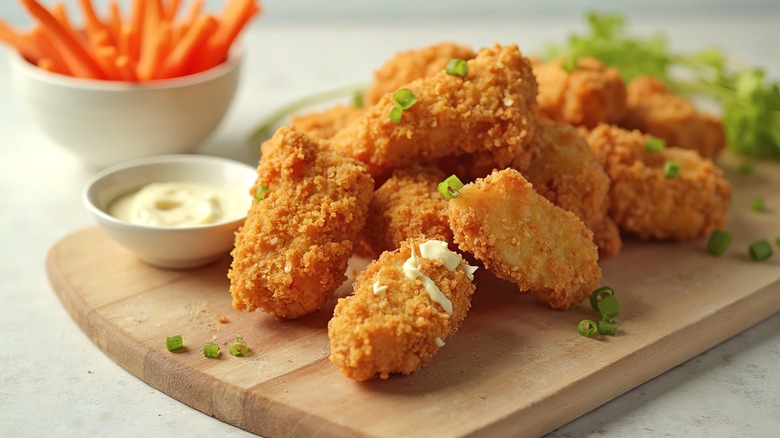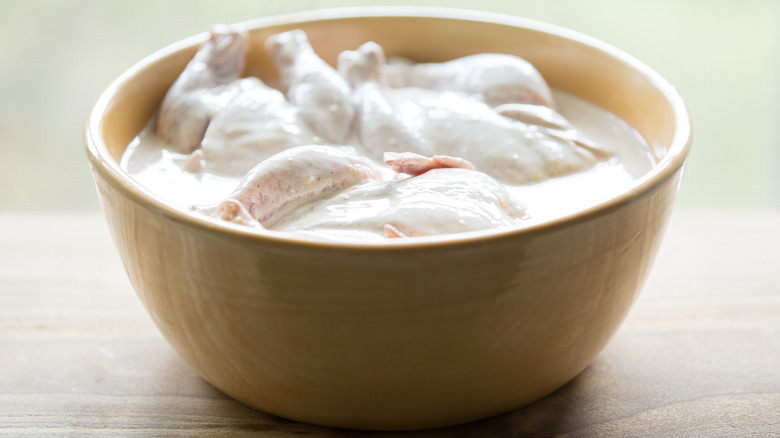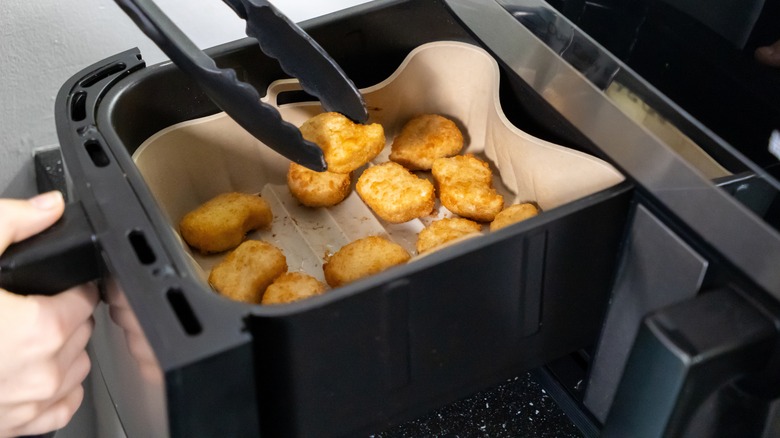The Juiciest Chicken Nuggets Are Only One Extra Step Away
Frozen chicken nuggets often come in fun shapes like sea creatures or dinosaurs, but they tend to be dry and flavorless. Homemade chicken nuggets, on the other hand, can be quite tasty, since you can make them with any ingredients you like. (I once did a crust made from crushed cheese crackers and it tasted pretty amazing even to this non-nugget fan.) If you want to ensure that the chicken stays juicy, though, it's all about the marinade. Kathleen Boureston, who shares recipes on her blog Gonna Want Seconds, favors using buttermilk.
"Buttermilk marinade gently tenderizes the meat with its slightly acidic composition but also helps act as a binder for chicken, helping to allow the breading to adhere to the chicken better," Boureston explained. Her recommendation is that you soak the chicken chunks for anywhere from 45 minutes to 2 hours before dipping them in the crumb coating. If you don't want to buy a carton of buttermilk for a recipe that only calls for a cup or so, you can easily make your own buttermilk by adding a tablespoon or two of distilled white vinegar or lemon juice to a cup of milk. A 50/50 mixture of milk and sour cream is another acceptable substitute for this ingredient.
What's the difference between a brine and a marinade?
Many restaurant menus use the phrase "buttermilk-brined" to describe their fried chicken (whether it be whole pieces or nuggets), but technically this is a misnomer that may have been adopted for alliterative purposes. As Boureston told The Takeout, "The differences between a brine and a marinade are subtle, but important. A brine is essentially salty water, and the goal is to pull water and salt into the interior of the meat. It can also help loosen the muscle fibers so they can retain more liquid, resulting in a plumper, juicier piece of meat that's seasoned internally as well as externally." Brining is one way to make great fried chicken, but many cooks, including Boureston, prefer to use a marinade.
Yes, that's what buttermilk is, since brines are water-based while marinades are made from other liquids. Typically, they are acidic (as buttermilk is), and in addition to providing moisture, they also flavor and tenderize the meat. Marinades do have one downside, though, in that you have to keep an eye on the time. Over-marinating is a common mistake that can ruin any chicken dish. According to Boureston, "Marinades can cause texture issues if the meat is left in the mixture for too long, since the acids can cause the exterior to take on a mushy or mealy quality."
More tips for tasty nuggets
The secret to keeping your nuggets juicy may be the buttermilk brine (as long as you don't overdo it), but Boureston was kind enough to supply us with several more tips for making homemade nuggets. For a crispy coating, don't just dip the nuggets in flour; use a 3:1 mixture of flour and cornstarch. Boureston also advises, "Season everything at each step. Season the buttermilk brine. Season the chicken after it comes out of the brine. Season the dredge you use to coat the chicken. Season the chicken after it is fried." That's a lot of seasoning. But then again, you don't want your nuggets to be bland. (The dipping sauce shouldn't have to do all the heavy lifting.)
"Your next job is just to make sure you don't overcook the nuggets," Boureston added. If you are deep-frying them, the oil should be kept at a temperature between 350 and 365 degrees Fahrenheit. The chicken is done cooking when it reaches an interior temperature of 165 degrees Fahrenheit. (The latter is also true if you're baking the nuggets.) It's also best to fry nuggets in small batches so they don't overcrowd the pan. As Boureston explained, "Working in batches is key to keeping the oil at the proper temp." She also provided one tip for air fryer users: "Make sure to lightly oil the breaded chicken before cooking. Dry flour won't brown, so this step is very crucial."


